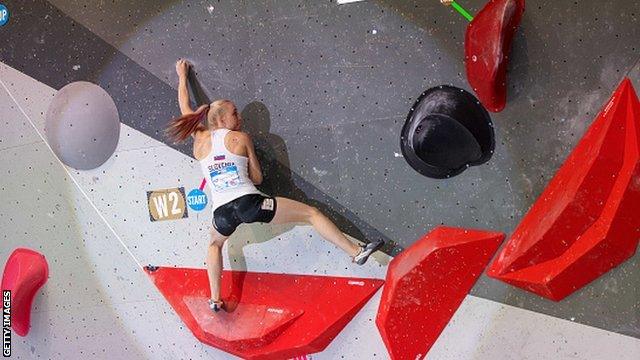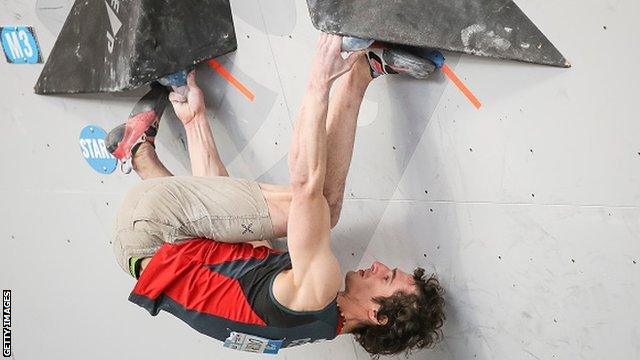Sport climbing makes its Olympic debut - here's all you need to know
- Published
Can Radio 1's Jordan North face his fears with climber Shauna Coxsey?
Tokyo Olympic Games on the BBC |
|---|
Dates: 23 July-8 August Time in Tokyo: BST +8 |
Coverage: Watch live on BBC TV, BBC iPlayer, BBC Red Button and online; Listen on BBC Radio 5 Live, Sports Extra and Sounds; live text and video clips on BBC Sport website and app. |
Climbing is the last of the new Olympic sports to make its appearance at Tokyo 2020, with competition getting under way on Tuesday.
Karate, skateboarding and surfing have already made their debuts, so now the focus switches to the walls in the Aomi Urban Sports Park.
Here we take you through everything you need to know, from how the sport works to which stars you should keep an eye on.
What is sport climbing?
It's an event that neatly embodies the revised Olympic motto 'faster, higher, stronger, together' - with competitors climbing walls using fixed hand and foot holds in three disciplines.
When is it taking place?
The men's competition will start on 3 August, with finals on 5 August. The women's event begins on 4 August, with finals on 6 August.
Which events are in the Olympics?
There are two gold medals up for grabs in Tokyo, with combined events for both men and women.
Forty climbers will be in action - 20 per competition, with each nation allowed a maximum of two people in each.
Climbing events usually include three separate disciplines - speed, bouldering and lead - but for the sport's Olympic debut they have been pulled together into bumper combined events.
At the 2024 Paris Games, speed will be a separate event, alongside a joint bouldering/lead competition.
How do the three disciplines work?
Speed: Two competitors race against each other to the top of a 15m high wall with a five degree overhang and have to hit a buzzer to stop the clock. The route is the same in every competition.
Bouldering: Climbers take turns to complete routes, known as problems, on a 4.5m structure in as few attempts as possible. They can have as many attempts as they like within a set time. Scores are determined by the number of problems either fully or partially solved. The problems are reset between qualification and finals and the climbers are allowed two minutes to observe the problem before the finals.
Lead: Competitors must climb as high as they can up a 15m wall within six minutes in one attempt. The route is changed between qualification and the finals and athletes are allowed to look prior to the finals.

Slovenia's Janja Garnbret has won successive combined world titles
How does the Olympic competition work?
Qualification
Each climber competes in speed, bouldering and lead - in that order.
In speed, climbers have two attempts - one on each lane - and their fastest time is recorded.
In bouldering, climbers must take on four boulders with a time limit of five minutes per boulder.
In lead, climbers compete one at a time and the height they reach is recorded.
Rankings are determined by multiplying the climbers' placings in all three disciplines, and the the top eight advance to the finals.
Finals
The scores are reset before each climber again competes in speed, bouldering and lead - in that order.
In speed, the climbers compete in three elimination races to determine their ranking.
In bouldering, all climbers attempt boulder one in turn before moving to boulder two, and do likewise for the third and final boulder. There is a time limit of four minutes per boulder.
In lead, climbers compete one at a time and the height they reach is recorded.
Rankings are determined by multiplying the climbers' placings in all three disciplines.

Adam Ondra is a five-time world champion
Who are the stars?
Shauna Coxsey is the only British athlete to have qualified - and this will be her last competition as she is retiring after the Games.
The 2019 combined and boulder world bronze medallist has had to cope with back pain since having an epidural for knee surgery in 2019.
Adam Ondra is the one to watch in the men's event.
The Czech is a five-time world champion but has recently recovered from a shoulder injury and is weaker in the speed discipline.

The man who introduced Joe Wicks to meditation: Exploring spirituality and mindfulness with Russell Brand
The Ancient Olympics: You're Dead To Me explores how even death couldn't stop you winning
